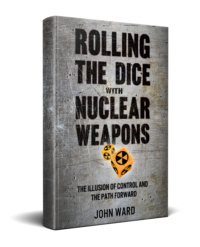Title: Rolling the Dice with Nuclear Weapons: The Illusion of Control and the Path Forward
Author: John Ward
Publisher: Our Planet Project Foundation Press
ISBN: 978-0-578-53936-2
Genre: Contemporary issues
Pages: TBA
Reviewed by: Barbara Bamberger Scott
Pacific Book Review
In 1945, America’s first nuclear bombs were tested and subsequently dropped on two Japanese cities, effectively ending World War II. Author John Ward began to study the long-term aftershocks of these events, and reports here on the results of his in-depth investigations.
Based on latest data, Ward speculates that nuclear weapons, if deployed by major world powers such as the US and the Soviet Union, would not destroy all human life, but the survivors would experience global “nuclear winter” along with starvation, anarchy, and generations of birth defects and cancers. Yet why should we worry? Are not we protected by policies like MAD (mutually assured destruction) that would prevent any sane power from deploying such weapons, even as they are still being stockpiled for that very possibility? Ward asserts that given not only the tenuous relationships between major and minor powers with nuclear capabilities but also the very real likelihood of some unpredictable mishap provoked by human error or computer glitch, “We may be living in the calm before the storm,” and need a plan to preserve our planet.
In substantial support of his noteworthy viewpoint, Mr. Ward traces the development of nuclear weapons from the coalescence of some of the world’s greatest minds at Los Alamos, New Mexico, to the creation of bombs that killed thousands of civilians in World War II, to the situation we know today, in which powerful nations or rogue players can threaten global hell from the murderous clout lurking in their arsenals.
Ward’s work is highly organized, expressing a serious desire to enlist support for worldwide oversight of nuclear resources, perhaps beginning with his organization, OurPlanetProjectFoundation.org. He depicts hypothetical and actual scenarios that bear our most serious consideration. Older readers will, through his eyes, recall the sense of doom that hung over the birth of the Nuclear Age, while younger readers will grasp the perilous complacency that pervades the current era.
Mr. Ward writes in human terms, presenting a plethora of factual material from the realms of science, history, and global politics – while also recounting many incidents where civilization was saved from destruction by only a tiny margin of fortuitous circumstance. His book is highly organized, rational, and at its heart, idealistic. It should be read and studied, discussed and shared, among all those who have concerns about the planetary threat that nuclear weapons still represent.


